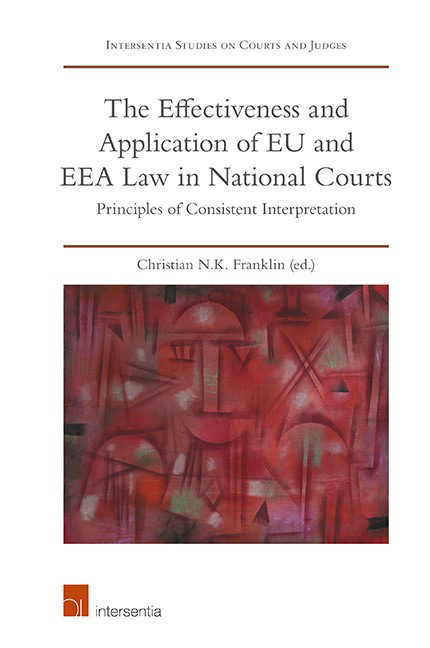 The Effectiveness and Application of EU and EEA Law in National Courts
The Effectiveness and Application of EU and EEA Law in National Courts France
Published online by Cambridge University Press: 31 January 2019
Summary
INTRODUCTION
A former president of the Conseil d’État ‘ s litigation division said: “ We interpret the law in accordance with general interest “. According to Judge Genevois, this statement shows that interpretation is “ the expression of a judicial policy “, and it is undoubtedly also true when consistent interpretation is applied in relation to European Union (EU) law. This contribution therefore intends to show that while consistent interpretation is generally applied in France in conformity with EU case-law, there are still remnants of judicial policy that make the overall situation unsatisfactory.
Before diving into a substantive analysis of relevant French case-law, it is important to outline its scope, as well as to recall some France-specific characteristics. Due to insufficient data in legal databases, the analysis must be limited to decisions from the Courde cassation (the supreme court of the judicial order), and from the Conseil dÉtat (the supreme court of the administrative order). Indeed, while all recent decisions from the Courde cassation and the Conseil d ‘État, as well as all decisions from the Conseil constitutionnel, are available online, only a limited number of decisions ruled in first instance and by lower courts of appeal are made available.
The scope of the decisions analysed is partly affected by the reasoning used by the judge. The French way of reasoning favours short decisions in which a syllogistic form is most likely the most prominent characteristic. This reasoning is not France-specific, but is commonly found in civil law systems. As Lord Justice Cooper said, “ The civilian naturally reasons from principles to instances, the common lawyer from instances to principles “. The brevity of the decision is more problematic for scholars who intend to work on case-law, because the opinions of the judges, the Advocate General and the Public Rapporteur are not made public. The same applies as far as the arguments presented by the applicants and defendants are concerned. This brevity often leads to highly technical, cryptic decisions written in one, single sentence. Therefore, only using keywords to search for decisions will never be sufficiently comprehensive. Using a keyword search must be accompanied by an analysis of legal doctrine.
- Type
- Chapter
- Information
- The Effectiveness and Application of EU and EEA Law in National CourtsPrinciples of Consistent Interpretation, pp. 149 - 176Publisher: IntersentiaPrint publication year: 2018
